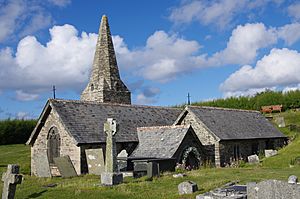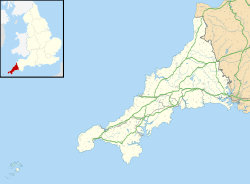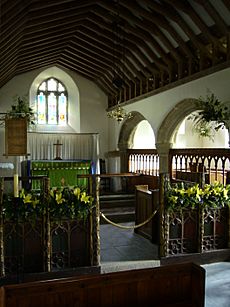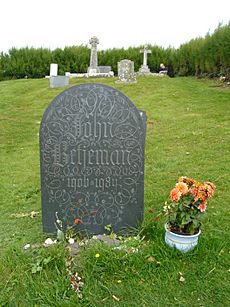St Enodoc's Church, Trebetherick facts for kids
Quick facts for kids St Enodoc's Church, Trebetherick |
|
|---|---|
 |
|
| 50°33′29″N 4°55′17″W / 50.5581°N 4.9215°W | |
| Location | Trebetherick, Cornwall |
| Country | United Kingdom |
| Denomination | Church of England |
| Architecture | |
| Architect(s) | J. P. St Aubyn (minor restoration) |
| Style | Early English |
| Completed | 1864 (restored) |
| Specifications | |
| Materials | Stone rubble with slate roofs |
| Administration | |
| Diocese | Truro |
St. Enodoc Church, Trebetherick (also known as St. Guenedoc in Old Cornish, Cornish: Gwenedek) is a historic church located near the village of Trebetherick in Cornwall, England. It is a very important building, recognized as a Grade I listed building, which means it has special historical or architectural significance.
Contents
A Church in the Sand
This unique church is found among sand dunes, close to Daymer Bay and Brea Hill. These dunes are near the River Camel estuary. For a long time, from the 1500s to the mid-1800s, the church was almost completely covered by sand. People even called it "Sinking Neddy" or "Sinkininny Church" because it seemed to be sinking!
To keep the church active, services had to be held there at least once a year. Imagine this: the vicar and people attending church had to climb down into the building through a hole in the roof because the sand was so high! By 1864, the sand was cleared away, and the dunes around the church were made stable. Today, the church is surrounded by the St Enodoc Golf Club's "Church course."
The Church's Long History
The church is believed to be built on the spot where a holy person named Enodoch once lived in a cave as a hermit (someone who lives alone for religious reasons). The oldest parts of the church building date back to the 1100s. More sections were added in the 1200s and 1400s.
By the 1700s, the church was partly buried by sand. In the 1800s, the sand was finally removed. The church was then cleaned and repaired under the guidance of Rev. W. Hart Smith, who was the vicar of St Minver. The main architectural repairs were done between 1863 and 1864 by an architect named J. P. St Aubyn.
What the Church Looks Like
The church is built from stone rubble (rough, broken stones) and has roofs made of slate. It has a main area called a nave, a chancel (the part where the altar is), and a south aisle (a passage) with three sections. There's also a north transept (a part that sticks out), which leads to the church tower. It's unusual because the tower is on the north side of the church, not the west.
The tower has two levels and a low, pointed roof called a broach spire. On each side of the tower, there are small openings with three-leaf shapes (called trefoils) where the bells are.
Inside the Church: Fittings and Furniture
Most of the church's furniture was replaced during the 1863–64 restoration. However, you can still see the base of a rood screen from the 1400s. The granite font (a basin for baptisms) is very old, from the 1100s. It has a round bowl lined with lead, sitting on a carved pillar with a rope-like design.
Inside the church, on the south wall, there is a memorial stone for Ernest Edward Betjeman (1872–1934). He was the father of the famous poet Sir John Betjeman. There is also a memorial for three crew members who sadly lost their lives when their ship, the brig Maria Asumpta, was wrecked in 1995.
Outside the Church: Churchyard and Beyond
In the churchyard, you'll find several old headstones and tomb chests that are also listed as Grade II historic structures. This means they are important too! The churchyard is also the resting place of John Betjeman, who was a famous British poet. His ashes are buried there, along with the ashes of Fleur Lombard, who was the first female firefighter to die while on duty in peacetime Britain.
About 1 kilometer (0.6 miles) south of the church is Jesus Well. This is a holy well with a stone wellhouse built over it. The wellhouse was likely rebuilt in the 1800s and repaired again in the 1900s. It is also a Grade II listed building. You can also see a Cornish cross in the churchyard. It's a stone cross with a head and the top part of its shaft. These pieces were found built into the churchyard wall in 1863.
St. Enodoc in Books
St. Enodoc Church has been featured in several books. The poet John Betjeman wrote about it in his poem Sunday Afternoon Service at St. Enodoc. The church also appears in Justin Cartwright's novel The Promise of Happiness (2004), which is partly set in Trebetherick.
In the novel The Last Patriot by Brad Thor, the main character, Scot Harvath, owns a house that is described as looking very similar to St. Enodoc Church.




